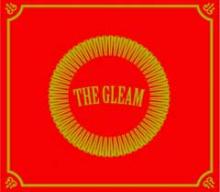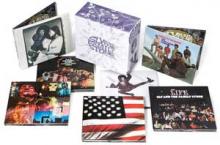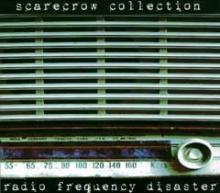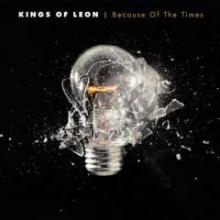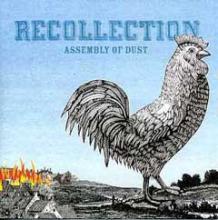Interview by Clara Rose Thornton
Close your eyes for a moment and envision Detroit, Michigan. If you've never ventured there before, the image that invades your mind probably comes straight from modern folklore -- abandoned blocks, burned-out hulls of buildings, empty car-manufacturing plants with rusty old Ford license plates rattling along the ground in the breeze. Now imagine the Detroit of yore, the Detroit of Motown's heyday or of mid-1970s rock. Did the image change to ingenues shimmying until dawn, afroed funk musicians laying down a groove and long-haired rocker boys air-guitaring into the night? Well, the reality is that Detroit's wholly unique culture and incredible vitality has not vanished along with its foothold in the auto industry, and it is precisely this music that has kept its thread of life long and sinewy. Detroit neo-synth/electro-funk darlings Bump arrived on the scene in 2001, and with their constant DIY touring and increasingly widespread praise and recognition, the glory days are poised to return. This summer, with their biggest nationwide tour ever, they'll be gracing the stages of several festivals -- most notably Dogstock, in Melvern, Kansas, a fest where proceeds from the 100+ band, four-stage extravaganza go directly to The Akita Adoption and Rescue Foundation. Funk inflections, 80's-inspired synths, soaring guitar riffs, angelic keyboards AND a good heart? You've got to read lead singer Yorg Kerasiotis tell it to believe it. Detroit Rock City, indeed.
Yorg Kerasiotis - Yes, that was his first show back. He's fine now; everything's back to 100%
HGMN - If my memory serves me right, you guys didn't even cancel any of your shows at the time -- you just forged on without him for a while.
YK - We had our producer come and fill in on guitar, which wasn't the same, but at least he knew all the songs. We did it without him, but it went fine.
HGMN - Wow. See, that road warrior sort of dedication seems like it's been a Bump mainstay from the beginning.
YK - That's the way it's been for six years.
HGMN - And it seems to be truly manifesting this summer. You're having your largest
and most comprehensive tour ever -- 40 dates in 17 states.
YK - (chuckles) Yeah, yeah; it's going to be great. We're really excited about it.
HGMN - How did that come about?
YK - To be honest with you, we usually like to tour for a month, then take a couple weeks off, go another month, then take a couple weeks off. You know, month by month by month. Although, now, two members of the band are getting married -- in August and September. So we're taking a month off in mid-August, and therefore decided to do the big, BIG tour right now. We're not stopping touring until mid-August. We're booked pretty solid. And then right after I get married, we're going out to California and to play there and then in Oregon, and next head down south and hit up Arizona, New Mexico and all that good stuff on the way down.
HGMN - Nice. Congratulations on the wedding, by the way.
YK - Yeah, lookout! Thanks! (laughs)
HGMN - Who else is getting married?
YK - Chris Sterr, actually -- the one you just talked about.
HGMN - Ah! Excellent! That's so beautiful.
YK - When it's the one, it's the one. That's all that matters.
HGMN - True words. Getting back to this touring aesthetic that you guys have adopted -- this principle of not canceling shows, of garnering more fans, of spreading your music and your style to as many people as possible across the largest landscape possible -- was this the goal when you decided to form the band?
YK - Always. We get categorized with the jambands a lot, yet if you actually go see a show, [you'll see that] we're very different than the quintessential jamband. Like, way different. If folks go see us, they'll think, "What are these guys? They're not anything specific that I've ever seen." But the one thing we do take from jambands is that we've always wanted to tour constantly. We're all about playing live, and becoming better musicians through playing live. That's always the goal, no matter what.
HGMN - Can you describe the band's origins?
YK - At Michigan State University we started. We branched off from there. We wanted to get as big as we could in Michigan. That all basically climaxed this year: We sold out the Majestic Theater in Detroit, which I think is around 1,300 people. It was absolutely the best; we had been playing there for four years. Currently we play all over Michigan and the Midwest. We're doing really well in Chicago. Though we wanted to branch out, so we started hitting up Colorado and all over the rest of the United States as much as we could. The name (Bump) has been getting bigger and bigger, so we can get the shows we want to get.
HGMN - Did you guys go to high school together?
YK - We all grew up in the same town. The bass player (Erick Novak) and the drummer (Clint Carpenter) went to the same high school, while the guitarist (Sterr) and I went to the same high school. We were the only two in the town - the North and South high schools. Everybody knew each other there.
HGMN - So what is it about music, and about rock n' roll specifically, that drove you to want to form a band, that drove you to create? In other words, what is it about the specific capabilities of the musical medium that spoke to you more than, say, wanting to make films with these guys or write books? Why music?
YK - I think that for all of the guys, ever since we were kids, we didn't see ourselves as doing anything other than being in band. That was it. It was like, something hit us. I could tell you a million influences that I've had throughout the years, just like the other members could. But mainly it's just that when we were kids, that's all we wanted to do. Since middle school, late elementary school... ever since we could have talent shows, we were in the talent shows. It was like, "When's the next gig?" When we were in sixth grade, we were thinking, "When can we get more gigs?" We were tired of just doing talent shows. [We thought to ourselves] can we play the coffeehouse, or can we play a bar down the street? We were barely 14 and trying to get gigs already. I guess that the combination of MTV and Motown in general - the oldies - greatly influenced us. We had good radio stations in Detroit. We knew about all the oldies before [other kids]. A lot of people would ask, "Are you kidding me? You're talking about somebody that was big thirty years ago." Well, yeah! That's what we know. We integrate all types and eras of music. We've always been influenced by it and we always thought we'd be a band.
HGMN - Given that philosophy about the joy of music, the joy of playing and how that was with you from the beginning, do you see a difference between the types of gigs that you get as an ever-touring band? For instance, the clubs versus these massive summer festivals that you're starting to be more involved in: Do you see a difference between those two touring experiences?
YK - At the clubs, the drawback is that no matter if you're the biggest band [on the bill] or the smallest, it's always hard to get people out. But you get a lot of good set-up time, you get your set right, you get a longer time to play. Yet we'll take the festivals anytime. It's just a gathering of people; so many people can utilize that time to come see you, even to come see three or four songs. If they love it, that's great. You can take the whole weekend to promote yourself. You bring CDs, you go around; for 10,000 Lakes and Dogstock we'll probably bring about 1,000 CDs to each. We'll distribute them and tell people about the gig. Even after the gig's over -- after we get done playing -- we'll be giving them out. It's a great way to make fans, it's a great way to meet people, and you get educated, too, because you can go around and see all the other bands that are playing with you and see what they're up to. It's all one. You can work and play, as well as go to school, at the same time. We love the festivals. The more festivals the better.
HGMN - So you love the festival atmosphere, even in terms of promotion, where there are dozens and dozens and sometimes more than a hundred other bands, more so than the club shows where it might be just you and another band or two? That's interesting.
YK - We love both. But, you can't beat the publicity [of festivals]. And you can't beat the overall atmosphere. I hate to take sides; there are no sides taken. But if there's a festival happening, chances are people are going to go to that festival. You go where the people are. And it's summer... (laughs) The festivals are where it's at.
HGMN - So you also think of it as more of a seasonal thing -- that's where the people are flocking during the summer?
YK - Yeah, and you know what's funny? About three years ago we all started realizing this when bar owners told us that bars hate summer. I'd say, "Hate summer?
What on earth? People are going out." (They'd respond) "They're not coming here! They're going to the outdoor festivals, they're walking around. Or they're getting shitcanned somewhere else, you know, out on their porch." Overall, bars do better in the winter. When the people are outside, you have to migrate to that sort of atmosphere.
HGMN - You mentioned Dogstock as one of Bump's preeminent festival opportunities this summer. How did you get hooked up with Dogstock?
YK - We were kind of whoring ourselves. We wanted to play every festival we could. Dogstock saw our package, loved what we were doing, saw that we were promoting hard for all our shows, saw that that we were doing a huge tour before the summer -- and therefore would be promoting for (Dogstock) during it. 10,000 Lakes has been really happy with us, too. They sent us 2,000 flyers, and when we distribute them all, we not only promote for us but we promote for the festival in general.
HGMN - Dogstock appears unique within the entire festival roster because of the fact that it's a benefit. And not only is it a benefit for a good cause but for a good cause aiding animals, which seems unheard of, to me, in terms of large-scale music festivals. This event will have 100+ bands on four different stages. That's massive -- and to have a significant amount of the proceeds go directly to The Akita Adoption and Rescue Foundation? That's so exquisite.
YK - It is exquisite, and that's what it's all about. All this hard work, that's what it's for. What should you want to do when you become a big rock band? You've got to help out. You've got to help out the world around you, because everything's going to shit right now. You've got help out as much as possible. So we're always happy to be a part of those [types of] things.
To be honest with you though, on top of that, I'm just so excited about the music in general. Bernie Worrell, Ivan Neville's Dumpsta Funk... I'm really excited about Dogstock because it seems like there are a lot of groovin' bands, a lot of beat-oriented funk bands. I can't wait to see Bernie Worrell; he's one of my idols.
HGMN - What can fans expect from a Bump set, specifically at a festival like Dogstock, where you have a limited amount of time to truly allow an audience to receive the band's essence? Describe your sound in that sort of live setting.
YK - Everyone that I've talked to who've heard us play - for example, at this radio show we just did -- they've said, "You're really good. What kind of music are you?" Then they'll tell us five genres they think we sound like. This one guy said, "You guys are like a cross between Pink Floyd and Maroon 5...but, no...not really!" So the only thing I can say is, if people come see us, they're not going to see a genre, per se. For instance, with a lot of the bands at festivals, people say, "Oh, we like to see [so and so], they're kind of folky," or "We like to see [this other band], they're electronica," or "Let's see that band, they're really rockin'." But if you're going to see Bump, you say, "Let's go see Bump. They're...out of this world!" You can't even explain it or box us in. It's a different experience. Every song is different. [The sound] has all of our influences there, and they run really deep. We take the parts of our influences that we think are the best parts about them, not necessarily the hits.
HGMN - It's funny you say that because in literally every article that I've read about Bump, the writer's saying, "Hmm, is it electronica? Or are they a jam band? Is it neo-Motown? Is it funk? We don't know. But we like it."
YK - And when you think about all those types you just rattled off -- we sort of sound like all of it, don't we? All of that stuff sounds good, but still, we're not going to be a funk band, we're not going to be an electronica band, we're not going to be a rock band. We're going to be all of those things. The thing we care about most, though, is that no matter what, there's a groove. There's a beat. You can move. No matter if it's a pop song or a jammy song -- you can move.
HGMN - In your press information, in the band members' bios, on the Web site, in various interviews -- there's always the sentiment that you are trying to, in a way, recreate but yet reinvent the classic Detroit sound. Detroit is known for a soulful, Motown-inspired, funky aesthetic that got lost, and now people don't immediately think of it when referencing Detroit. And somehow you guys are trying to bring that back, yet with a futuristic element to it: Electro-Motown. Can you comment on that?
YK - We're inspired to write the songs we want to write because of that connection, but when we actually get them down and play them for people, it can be heard that we're inspired by and commenting on it, but we don't copy it. We do our own thing with it.
HGMN - Was that a conscious element of your passion when you were younger? To incorporate your hometown sound?
YK - Not really, it was a natural thing. All the guys in the band, we really dig to find old records that most people wouldn't know about unless they're really into eclectic, "retired" sounds. We try to find that stuff that people haven't heard, and let that inspire us, rather than something that's blatantly happenin' at the moment in musical culture. I think that was always the case; I just want to do something brand new. We're trying to be the future.
Lookout for Bump's upcoming double album in the fall, Astronomica, what Kerasiotis calls a "space-rock opera, a musical adventure that tells an insane, complete story." Their debut studio CD, Incredible Consequence, is available now.


